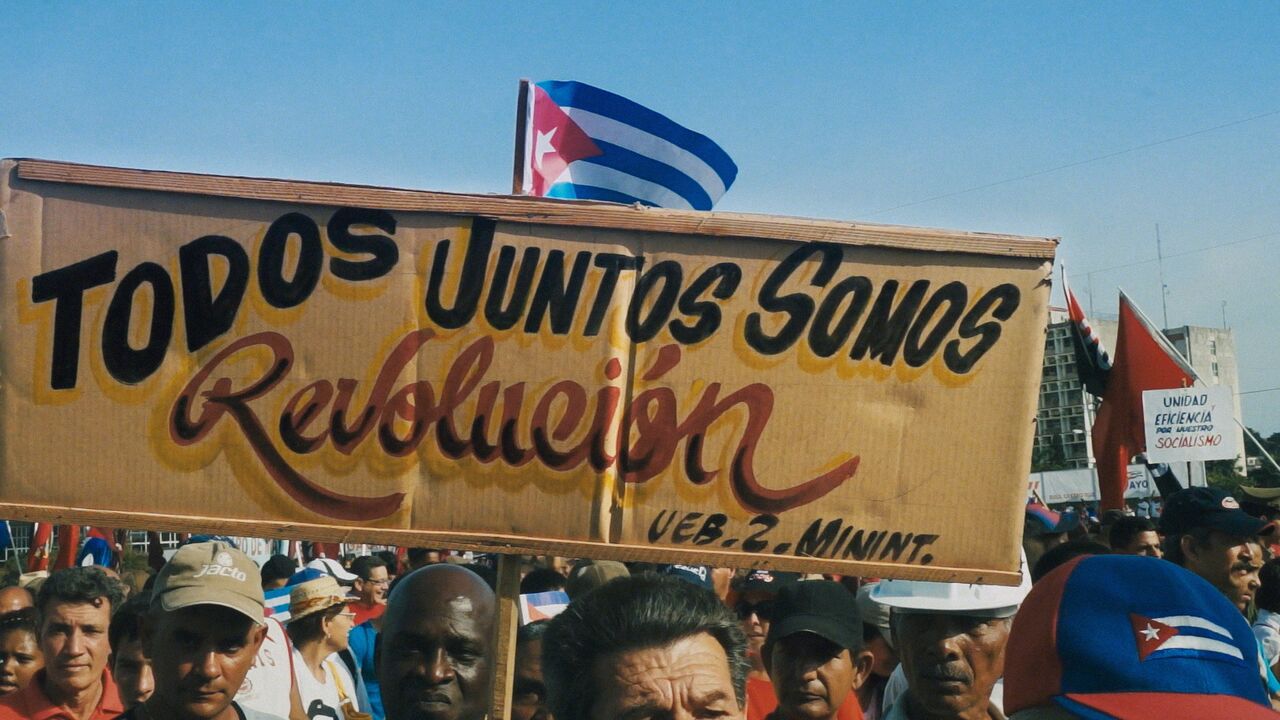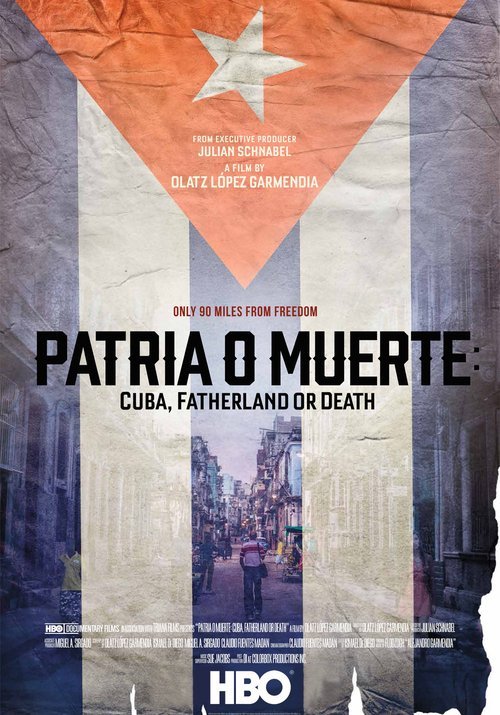Inspiration to revolt against a government that’s not serving its citizens’ needs can often be sparked from a few people who voice their opposition to their leaders’ rulings. As seen with the Cuban Revolution in the 1950s, a coup that was meant to bring more freedom to the people ultimately turned the country into the current Unitary Marxist–Leninist one-party state, which isn’t helping its citizens. Filmmaker Olatz López Garmendia’s new documentary, ‘Patria o Muerte: Cuba, Fatherland or Death,’ powerfully highlights how the country’s current dictatorship is guiding more people today to rebel against their oppressive leaders.
‘Patria o Muerte: Cuba, Fatherland or Death’ marks the documentary film directorial debut of Garmendia, who also produced the movie with Oscar-nominated executive producer, Julian Schnabel. The helmer also collaborated with cinematographer Claudio Fuentes Madan to capture interviews with, and images of, the residents featured in the movie.
The HBO Documentary Films release is set to debut tonight at 8pm ET/PT exclusively on HBO, after it screened at the New York Film Festival last month. ‘Patria o Muerte: Cuba, Fatherland or Death’ will also be available on HBO NOW/HBO GO staring tonight at 8, as well as On Demand starting tomorrow. The movie will also play on HBO and HBO2 several times throughout December. The documentary’s premiere screening on the American premium cable television network comes just three days after the death of the former Cuban President, Fidel Castro.
‘Patria o Muerte: Cuba, Fatherland or Death’ provides contemporary context for Cuba, a country that has experienced limited growth since its revolution in the 1950s. Utilizing percussive music and vibrant images to tell the story of life in Cuba, Garmendia interviews a diverse group of people who are currently living in the Latin American country. Among the residents the filmmaker speaks with are a prize-winning author who could not be published in Cuba until recently; an artist and political activist who was imprisoned for his passion for freedom; an architect who escaped oppression; and a number of everyday Cubans who express frustration over their lack of opportunity and decaying living conditions.
The film shows how the Cuban people live their lives amidst political unrest and economic inequality during a time when the country is on the cusp of cultural, social and economic change. The potential advancement is one of the results of American President Obama’s 2014 announcement that the U.S. would begin normalizing relations with Cuba. Garmendia showcases a portrait of people who are struggling to get by, but are also determined to have their voices heard through their words, art and music.
Garmendia generously took the time recently to participate in an exclusive interview at HBO’s New York City offices to talk about making her documentary film directorial and producing debuts with ‘Patria o Muerte: Cuba, Fatherland or Death.’ Among other things, the filmmaker discussed how she decided to helm a documentary about the live of Cubans, as she wanted to showcase the changes that are happening in the Latin American country. She also shared that she believes that freedom of speech and human rights are the most important obstacles that Cubans are currently facing, so she feels like she needed to emphasize those themes in the film.
ShockYa (SY): You made your documentary film directorial debut with the new movie, ‘Patria o Muerte: Cuba, Fatherland or Death,’ which shines a spotlight on Cuba and its people, providing contemporary context for a country that has experienced limited growth since its revolution in the 1950s. What interested you in helming a movie that explores the experiences Cubans have experienced since the country’s revolution?
Olatz López Garmendia (OLG): I have had an interest in Cuba my entire life, because my family lived there in the past. A lot of people in Europe sympathized with the Cuban Revolution in the 1960s, which is when my family lived there.
I also worked with Julian Schnabel when he (directed and executive produced the 2000 biographical drama,) ‘Before Night Falls’ (which tells the story of Cuban poet and novelist, Reinaldo Arenas). We started visiting to Cuba in 1993, and have continued traveling there until now.
So I have gotten to know the country more deeply than just a tourist point-of-view. As a result, the documentary came about from me traveling to Cuba for 20 years. I have been getting to know a lot of Cuban people, as well as a part of the country that’s not what you see at first view. So I was very touched with what’s going on there.
The first time I went to Cuba was in the beginning of the ’90s, which is what they call a special period. During that time, the Soviet Union stopped helping Cuba, so it was a really bad moment, during which time they were really struggling. There wasn’t any food or cars, and the country was falling apart. So that created a big impression on me.
I remember we stayed in a hotel that’s in the center of Havana. When I went up to the hotel’s roof, which had a restaurant at the time, I saw the city, and it looked like Berlin after the war. There was destruction everywhere. Everything was in black and white, as there wasn’t any paint, and everything was falling apart. So that created a big impact on me, and after that, I always wanted to tell what I saw.
But now things are different, as there are changes going on in Cuba. This documentary is about the changes that are happening in Cuba now.
SY: The film includes revealing interviews with a number of everyday Cubans who express frustration over their lack of opportunity and decaying living conditions. What was the process of securing the interviews for the documentary?
OLG: Since this is a documentary, and I didn’t really have a script, I was interested in speaking with regular people from the street. I think their testimonies are very powerful. They’re talking about politics without truly talking about politics. They’re openly discussing the problems they have as they’re trying to survive day by day. To me, the people in the film have the most powerful testimonies.
Then I started talking to all of the people in the artistic community, including the writers and musicians. I also had the change to meet someone from the opposition, and I was very interested in that aspect. So there’s a section in the film that talks about the opposition. But I didn’t plan that; I was ready to talk to whoever wanted to talk to me.
The people in Cuba who have something to denounce are always ready to talk to you. As soon as they see anyone with a camera, they use the opportunity, because they have very little to lose. Their needs are stronger than their fear.
SY: How important was it for you to show that people of the opposition are taking whatever means necessary to implement freedom of speech, and discuss what they’re feeling with the media?
OLG: I think freedom of speech and human rights are the most important themes of the film. I think that applies to everyone, from the regular people in the street to the artist and opposition. The lack of freedom and human rights is a theme that they all have in common.
SY: What was your experience of working with ‘Patria o Muerte: Cuba, Fatherland or Death’s cinematographer, Claudio Fuentes Madan, on determining how you wanted the overall documentary to look, and represent life in Cuba?
OLG: It was very difficult to coordinate ways to work with Claudio, because he’s a member of the opposition. We weren’t allowed to film, as we didn’t have official permission. It was also extremely difficult to get the material out of Cuba.
The communication between us was almost impossible. Many people in Cuba don’t speak on the phone, because there’s a paranoia there about it. They all think the government is listening to them, and they probably are listening to certain people. There also isn’t internet there.
So I was only able to speak with Claudio once a week. He was able to go into one of the embassies, where they let him use the internet. We could only talk every Tuesday, which made things difficult.
We then had to find someone who could take the flash drives out of Cuba. We had to find somebody who travels, and that was difficult.
SY: The documentary also shows how Cuba is on the cusp of cultural, social and economic change in the wake of President Obama’s 2014 announcement that the U.S. would begin normalizing relations. From what you witnessed while making the film, how has the change in Cuba’s economic and political climates influenced the way of life for the country’s citizens?
OLG: Well, there’s a little change, but I think we see the change more than they see it. There is some openness for the private businesses now. But there’s still a big limitation, so not everyone can open a business. Some people can open a little restaurant, but it’s still very limited in the business world. Not everyone has seen the change yet, and they won’t for many years; the changes that are only being seen now are only affecting certain minorities.
SY: What was the process like of also collaborating with Ismael de Diego, who served as the editor on ‘Patria o Muerte: Cuba, Fatherland or Death?’
OLG: During the editing process, we had to find a common theme between all the people I interviewed. Obviously, since there wasn’t a script at the beginning, I allowed everyone talk about what they wanted to talk about. But then in the editing process, we figured out a way to connect everyone. We found things that they all talked about, including not having internet access, their lack of freedom and having to survive with salaries of $20 a month.
I then created three segments of interviews, including the regular people, the artists and the opposition. But they all more or less talk about the same things.
Ismael de Diego, who’s Cuban, is a wonderful editor. We built up the story together, but we needed to change certain things in the final version of the film, like when Presidents Obama and Raúl Castro decided to normalize relations. Since the documentary is like a militant document, we had to update it all the time. So that made it both more difficult and interesting when we were making the film. It was a big challenge, but I enjoyed the experience.
SY: Before ‘Patria o Muerte: Cuba, Fatherland or Death’ premieres on HBO, you brought it on the festival circuit. What was the experience of screening it at the New York Film Festival’s Spotlight on Documentary section? How have audiences who have seen the movie at the festival responded to the film?
OLG: It was a good experience, because I felt that I did something important with the film. I felt like I gave these characters a voice, and am able to get their message out. I think it’s important for these people’s testimonies to be shown to worldwide audiences.
Watch the trailer, and check out the poster and a still, for ‘Patria o Muerte: Cuba, Fatherland or Death’ below.

Written by: Karen Benardello

